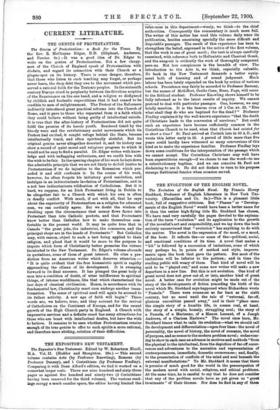CURRENT LITERAT LIRE.
THE GENIUS OF PROTESTANTISM.
The Genius of Protestantism : a Book for the Times. By the Rev. R. McCheyne Edgar, D.D. (Oliphant, Anderson, and Ferrier. 6s.) –It was a good ides of Dr. Edgar to write on the genius of Protestantism. Not a few clergy- men of the Chinch of England speak of Protestantism with disdain, and regard its connection with their Church as a plague-spot on its history. There is some danger, therefore, that those who listen to such teaching may forget, or perhaps never learn, the deep debt they owe to the movement which pre- served a rational faith for the Teutonic peoples. In the sixteenth century Europe stood in perplexity between the frivolous sceptics of the Renaissance on the one hand, and a religion so disfigured by childish and fahtastic superstitions that it had ceased to be credible to men of enlightenment. The Protest of the Reformers indirectly introduced great practical reforms into the Church of Rome, and it gave to those who separated from it a faith which they could believe without being guilty of intellectual suicide. It is true that the after-history of Protestantism did not quite fulfil the promise of its heroic youth. Rendered timid by the bloody wars and the revolutionary social movements which its Protest had excited, it sought refuge behind the State, became intellectually timid, and often spiritually slothful. But its original genius never altogether deserted it, and its history can show a record of quiet moral and religious progress to which it would not be easy to find a paralleL Dr. Edgar writes with know- ledge and with unflagging enthusiasm, and we credit him with the wish to be fair. In the opening chapter of his work he lays down the admirable principle that we are not likely to do full justice to Protestantism if we do injustice to the Romanism which pre- ceded it and still confronts it. In the course of his work, however, he often forgets his initiatory good resolution, and indulges in an indiscriminate laudation of Protestantism, and in a not less indiscriminate vilification of Catholicism. But it is hard, we suppose, for an Irish Protestant living in Dublin to be altogether fair to a Church with which his own is often in deadly conflict With much, if not with all, that he says about the superiority of Protestantism as a religion for educated men, we can cordially agree. But we doubt the wisdom of dwelling upon the circumstance that money flows faster into Protestant than into Catholic pockets, and that Protestants know better than Catholics how to make themselves com- fortable in the present world. It may be quite true that in Canada "the great jobs, the industries, the commerce, and the principal shops are in the hands of Protestants." But Catholics may, with reason, object to such a test being applied to their religion, and plead that it would be more to the purpose to inquire which form of Christianity better promotes the virtues inculcated in the New Testament. Dr. Edgar's volume abounds in quotations, some of them of great interest. He cites a pre- diction from an American writer which deserves attention :— "It is quite evident that the free humanistic spirit is rapidly approaching the climax of its development. It is sweeping forward to its final excesses. It has plunged the great body of men into a condition of doubt, of utter indifference to spiritual things, of intense worldliness, like that which characterised the last days of classical civilisation. Hence, in accordance with its fundamental law, Christianity must soon undergo another trans- formation. The sense of spiritual need will again be aroused to its fullest activity. A new age of faith will begin." These words are, we believe, true; and they account for the revival of Catholicism on the Continent of Europe, and for the recent growth of the High Church party in England. A Church with impressive services and a definite creed has many attractions for those who are beset with intellectual doubts, but have the wish to believe. It remains to be seen whether Protestantism retains enough of its true genius to offer to such spirits a more rational, and therefore more abiding, solution of their difficulties.






































 Previous page
Previous page